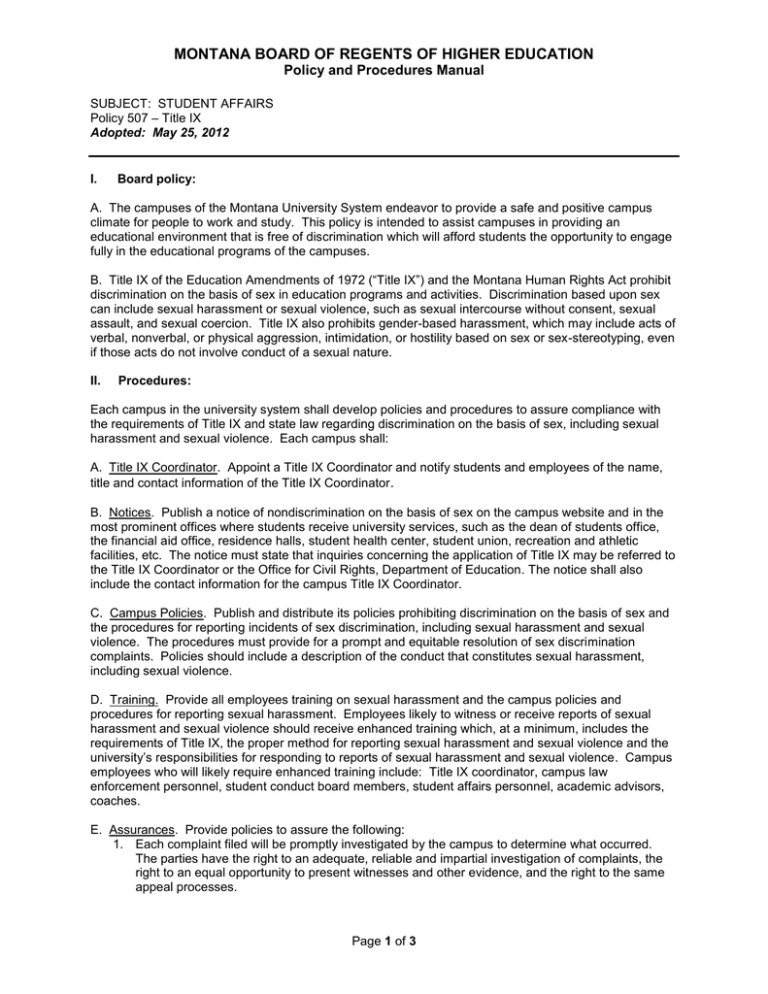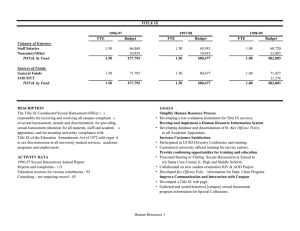
MONTANA BOARD OF REGENTS OF HIGHER EDUCATION
Policy and Procedures Manual
SUBJECT: STUDENT AFFAIRS
Policy 507 – Title IX
Adopted: May 25, 2012
I.
Board policy:
A. The campuses of the Montana University System endeavor to provide a safe and positive campus
climate for people to work and study. This policy is intended to assist campuses in providing an
educational environment that is free of discrimination which will afford students the opportunity to engage
fully in the educational programs of the campuses.
B. Title IX of the Education Amendments of 1972 (“Title IX”) and the Montana Human Rights Act prohibit
discrimination on the basis of sex in education programs and activities. Discrimination based upon sex
can include sexual harassment or sexual violence, such as sexual intercourse without consent, sexual
assault, and sexual coercion. Title IX also prohibits gender-based harassment, which may include acts of
verbal, nonverbal, or physical aggression, intimidation, or hostility based on sex or sex-stereotyping, even
if those acts do not involve conduct of a sexual nature.
II.
Procedures:
Each campus in the university system shall develop policies and procedures to assure compliance with
the requirements of Title IX and state law regarding discrimination on the basis of sex, including sexual
harassment and sexual violence. Each campus shall:
A. Title IX Coordinator. Appoint a Title IX Coordinator and notify students and employees of the name,
title and contact information of the Title IX Coordinator.
B. Notices. Publish a notice of nondiscrimination on the basis of sex on the campus website and in the
most prominent offices where students receive university services, such as the dean of students office,
the financial aid office, residence halls, student health center, student union, recreation and athletic
facilities, etc. The notice must state that inquiries concerning the application of Title IX may be referred to
the Title IX Coordinator or the Office for Civil Rights, Department of Education. The notice shall also
include the contact information for the campus Title IX Coordinator.
C. Campus Policies. Publish and distribute its policies prohibiting discrimination on the basis of sex and
the procedures for reporting incidents of sex discrimination, including sexual harassment and sexual
violence. The procedures must provide for a prompt and equitable resolution of sex discrimination
complaints. Policies should include a description of the conduct that constitutes sexual harassment,
including sexual violence.
D. Training. Provide all employees training on sexual harassment and the campus policies and
procedures for reporting sexual harassment. Employees likely to witness or receive reports of sexual
harassment and sexual violence should receive enhanced training which, at a minimum, includes the
requirements of Title IX, the proper method for reporting sexual harassment and sexual violence and the
university’s responsibilities for responding to reports of sexual harassment and sexual violence. Campus
employees who will likely require enhanced training include: Title IX coordinator, campus law
enforcement personnel, student conduct board members, student affairs personnel, academic advisors,
coaches.
E. Assurances. Provide policies to assure the following:
1. Each complaint filed will be promptly investigated by the campus to determine what occurred.
The parties have the right to an adequate, reliable and impartial investigation of complaints, the
right to an equal opportunity to present witnesses and other evidence, and the right to the same
appeal processes.
Page 1 of 3
MONTANA BOARD OF REGENTS OF HIGHER EDUCATION
Policy and Procedures Manual
SUBJECT: STUDENT AFFAIRS
Policy 507 – Title IX
Adopted: May 25, 2012
2. The parties will be notified of: (a) the timeframe within which the campus will conduct a full
investigation of the complaint; (b) the outcome of the complaint; and (c) the right to file an appeal,
if applicable.
3. Opportunity for the complainant to be advised of the options available for pursuit of complaints.
4. All parties will be provided with a status update of the investigation after 30 days.
5. A preponderance of the evidence standard will be used to decide complaints (i.e., it is more likely
than not that sexual harassment or violence occurred).
6. Complainants and respondents will be notified, in writing, of the outcome of the complaint,
including whether the campus determined that sexual harassment or violence occurred and, in
accordance with federal and state privacy laws, the sanction imposed against a student,
employee or third party.
7. Mediation may not be used to resolve complaints of sexual assault.
8. Prohibition of retaliation against any person reporting or participating in an investigation of sexual
harassment and sexual violence under the campus policies and procedures.
III. Reporting sexual violence:
A. Employee Reports.
1. Any campus employee informed of an allegation of sexual violence involving a student must
promptly notify the Title IX Coordinator.
2. Campus employees serving in certain professional roles which enjoy a statutory privilege are not
required to disclose information which is privileged under Montana law (e.g., medical providers,
licensed professional counselors, rape crisis counselors). Therefore, to the extent that these
employees receive information in connection with the performance of their professional
responsibilities, they are not required to report under this section unless otherwise required to do
so by law. [Ref. §§ 27-1-1102, MCA and 50-16-530, MCA]
B. Initiation of Action. Upon receipt of a report the Title IX Coordinator will promptly investigate to
determine what occurred and then take appropriate steps to resolve the situation. The Title IX
Coordinator will initiate actions to ensure that the educational environment is free of discrimination which
includes stopping any harassment and preventing any reoccurring harassment. Additionally, as
appropriate, steps will be taken to remedy the effects of any harassment on the complainant. This may
include commencement of the disciplinary process against an accused student or employee.
C. Reports to law enforcement.
1. Reports of crimes may be filed with law enforcement with or without the assistance of the
campus. Each campus will assist any student wishing to file a report to law enforcement. The
Title IX Coordinator will report complaints of sexual violence to law enforcement agencies when
requested to do so by an alleged victim.
2. The Title IX Coordinator, in consultation with appropriate campus officials, shall analyze each
report of sexual violence to determine if a health or safety emergency as defined by state and
federal law warrants disclosure of information relating to the complaint. In such case, information
relating to the complaint will be disclosed to the appropriate persons including law enforcement
personnel.
3. A campus Title IX Coordinator may disclose the fact and nature of a sexual assault to local law
enforcement officials in accordance with an agreement between the campus and the law
enforcement authority. Such agreement must be approved by university legal counsel.
4. Timely warnings or emergency notifications issued under the Clery Act related to sexual violence
shall also be sent to local law enforcement agencies.
Page 2 of 3
MONTANA BOARD OF REGENTS OF HIGHER EDUCATION
Policy and Procedures Manual
SUBJECT: STUDENT AFFAIRS
Policy 507 – Title IX
Adopted: May 25, 2012
IV. Confidentiality of the Alleged Victim:
Student confidentiality will be respected to the extent possible. Even if the alleged victim requests
confidentiality or asks that the complaint not be pursued, a campus is required to:
A. take all reasonable steps to investigate and respond to the complaint to the extent possible
consistent with the alleged victim’s wishes;
B. notify the alleged victim that the failure of the alleged victim to pursue a complaint may limit
the campus’ ability to fully address the matter; and
C. report the incident or assault to local law enforcement authorities if a health or safety
emergency as defined by state or federal law is found by the campus to require such reporting.
V.
Approval of Procedures by University Counsel
Campus Title IX policies and procedures must be approved by university legal counsel.
History:
ITEM 155-103-R0512, May 25, 2012.
Page 3 of 3



